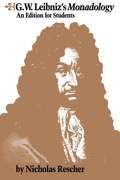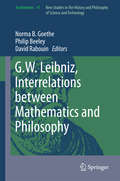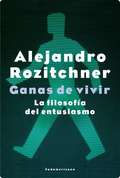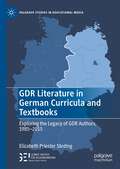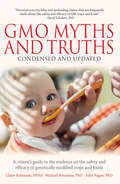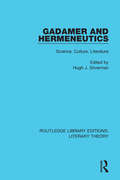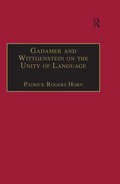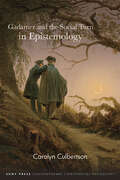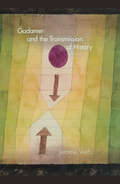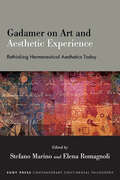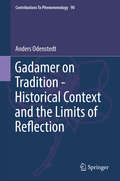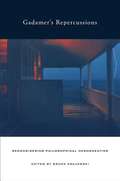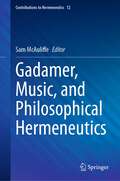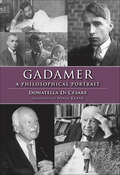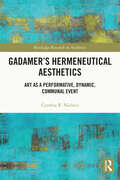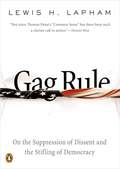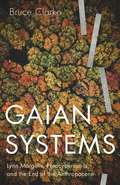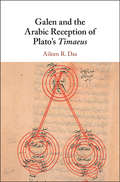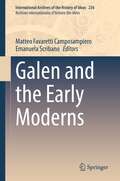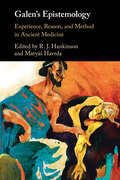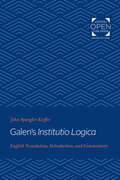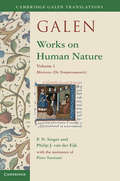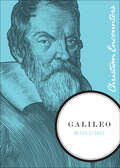- Table View
- List View
G.W. Leibniz's Monadology
by Nicholas RescherFirst published in 1992. Routledge is an imprint of Taylor & Francis, an informa company.
G.W. Leibniz, Interrelations between Mathematics and Philosophy
by Norma B. Goethe Philip Beeley David RabouinUp to now there have been scarcely any publications on Leibniz dedicated to investigating the interrelations between philosophy and mathematics in his thought. In part this is due to the previously restricted textual basis of editions such as those produced by Gerhardt. Through recent volumes of the scientific letters and mathematical papers series of the Academy Edition scholars have obtained a much richer textual basis on which to conduct their studies - material which allows readers to see interconnections between his philosophical and mathematical ideas which have not previously been manifested. The present book draws extensively from this recently published material. The contributors are among the best in their fields. Their commissioned papers cover thematically salient aspects of the various ways in which philosophy and mathematics informed each other in Leibniz's thought.
GANAS DE VIVIR (EBOOK)
by Alejandro RozitchnerAlejandro Rozitchner es un intelectual de nuestro tiempo, conocido por su estilo provocador y por su concepción afirmativa de la realidad. Como pensador desarrolló una visión del mundo en la que se conjugan la filosofía existencialista, la psicoterapia y una gran influencia de Nietzsche. Ganas de vivir propone una posición vital positiva e inteligente, es una guía que influenciará con seguridad a sus lectores dándoles fuerza y ayudándolos a desplegar su mundo personal. Un texto cargado de perspectivas para fortalecer el desarrollo propio y ajeno, un libro amistoso que busca meterse en la vida concreta para producir orientación y favorecer el autoconocimiento.
GDR Literature in German Curricula and Textbooks: Exploring the Legacy of GDR Authors, 1985-2015 (Palgrave Studies in Educational Media)
by Elizabeth Priester StedingThis book analyzes the changing portrayal of GDR literature in German Gymnasium textbooks 1985-2015. Addressing the need for textbook research to broaden its focus from GDR history to GDR literature, the author presents case studies of well-known GDR authors (Bertolt Brecht, Johannes R. Becher, Anna Seghers, Wolf Biermann, and Christa Wolf), each examining a particular aspect of the societal discourse about GDR literature and the tension between (literary) text and (historical) context. Taken together, the case studies reveal the frequently underestimated power of ideology in literature textbooks. They also show how attempts to package these authors into simplified categories ultimately reveal the profound complexities of the GDR literary legacy. By examining the clear tension between literature and politics in textbooks and curricula, the author demonstrates how ideological messages are transmitted in all textbooks, as well as the importance of attending to overt and covert ideology.
GMO Myths and Truths: A Citizen’s Guide to the Evidence on the Safety and Efficacy of Genetically Modified Crops and Foods, 3rd Edition
by Claire Robinson John Fagan Michael AntoniouIt is often claimed that the case against genetically modified (GM) crops and foods is based on emotion, not science, and that to oppose GM crop and food technology is to be anti-science. It is also claimed that GM crops offer higher yields and better nutrition, that they are safe for health and the environment, that they reduce agrochemical use, and that they are needed to feed the world's growing population. This book, co-authored by two genetic engineers and a writer/researcher, exposes these claims as false, using scientific and other documented evidence. GMO Myths and Truths summarizes the facts on the safety and efficacy of genetically modified (GM) crops and foods in terms that are accessible to the non-scientist but still relevant to scientists, policymakers and educators. The evidence presented points to many hazards, risks, and limitations of genetic engineering technology. These include harms found in animal feeding and ecological studies, which in turn indicate risks to health and the environment posed by GM crops and foods. The layout of the book enables those readers with limited time to read the chapter summaries, while providing more detail and full references for those who require them. At 164 pages of paperback size, this new condensed version is shorter and more accessible than the authors' 330-page report by the same name, which has been downloaded over half a million times. The book shows that conventional breeding continues to outstrip GM in developing crops that deliver high yields, better nutrition, and tolerance to extreme weather conditions and poor soils. In agreement with over 400 international experts who co-authored a UN and World Bank-sponsored report on the future of farming, the authors conclude that modern agroecology, rather than GM, is the best path for feeding the world's current and future populations in a safe and sustainable way.
Gadamer and Hermeneutics: Science, Culture, Literature (Routledge Library Editions: Literary Theory #12)
by Hugh J. SilvermanThis title, first published in 1991, opens with an account by Gadamer of his own life and work and their relation to the achievements of hermeneutics. Building upon the key theme of dialogue, Gadamer and Hermeneutics provides a series of essays, either linked Gadamer to other major contemporary philosophers or focusing on a given Gadamerian theme. This book will be of interest to students of literary theory.
Gadamer and Wittgenstein on the Unity of Language: Reality and Discourse without Metaphysics (Ashgate Wittgensteinian Studies)
by Patrick Rogers HornIn this innovative comparison of Gadamer and Wittgenstein, the author explores their common concern with the relation of language to reality. Patrick Horn's starting point is the widely accepted view that both philosophers rejected a certain metaphysical account of that relation in which reality determines the nature of language. Horn proceeds to argue that Gadamer never completely escaped metaphysical assumptions in his search for the unity of language. In this respect, argues Horn, Gadamer's work is nearer to the earlier rather than to the later Wittgenstein. The final chapter of the book highlights the work of Wittgenstein’s pupil Rush Rhees, who shows that Wittgenstein's own later emphasis on language games, while doing justice to the variety of language, does less than justice to the dialogical relation between speakers of a language, wherein the unity of language resides. Contrasting Rhees's account of the unity of language with those given by Gadamer and the early Wittgenstein brings out the importance of understanding reality in terms of the life that people share rather than in terms of what philosophers say about reality.
Gadamer and the Legacy of German Idealism
by Kristin GjesdalThe philosophy of Hans-Georg Gadamer interests a wide audience that spans the traditional distinction between European (continental) and Anglo-American (analytic) philosophy. Yet one of the most important and complex aspects of his work - his engagement with German Idealism - has received comparatively little attention. In this book, Kristin Gjesdal uses a close analysis and critical investigation of Gadamer's Truth and Method (1960) to show that his engagement with Kant, Hegel, and Schleiermacher is integral to his conception of hermeneutics. She argues that a failure to engage with this aspect of Gadamer's philosophy leads to a misunderstanding of the most pressing problem of post-Heideggerian hermeneutics: the tension between the commitment to the self-criticism of reason, on the one hand, and the turn towards the meaning-constituting authority of tradition, on the other. Her study provides an illuminating assessment of both the merits and the limitations of Gadamer's thought.
Gadamer and the Social Turn in Epistemology (SUNY series in Contemporary Continental Philosophy)
by Carolyn CulbertsonWhile some take Gadamer's Truth and Method to be a departure from epistemological questions and concerns, author Carolyn Culbertson reads Gadamer's work as offering a valuable reflection on the nature of understanding—one that is deeply resonant with the recent social turn in epistemology. Like social epistemologists, Gadamer worries about the epistemic irresponsibility that we encourage when we treat an attitude of objectivity, wherein the inquirer lacks any awareness of their social and historical situation, as an epistemic ideal. Like social epistemologists too, Gadamer argues that understanding that one is socially and historically situated does not mean believing that one is fated to simply repeat traditional ideas without critique or modification—a concern frequently raised in response to critiques of Enlightenment epistemology. By developing such parallels, Gadamer and the Social Turn in Epistemology offers seasoned readers of Gadamer a new context in which to appreciate his discussion of understanding in Truth and Method and readers unfamiliar with Gadamer a productive point of access into his major work.
Gadamer and the Transmission of History (Studies In Continental Thought Ser.)
by Jerome VeithObserving that humans often deal with the past in problematic ways, Jerome Veith looks to philosopher Hans-Georg Gadamer and his hermeneutics to clarify these conceptions of history and to present ways to come to terms with them. Veith fully engages Truth and Method as well as Gadamer's entire work and relationships with other German philosophers, especially Kant, Hegel, and Heidegger in this endeavor. Veith considers questions about language, ethics, cosmopolitanism, patriotism, self-identity, and the status of the humanities in the academy in this very readable application of Gadamer's philosophical practice.
Gadamer on Art and Aesthetic Experience: Rethinking Hermeneutical Aesthetics Today (SUNY series in Contemporary Continental Philosophy)
by Stefano Marino; Elena RomagnoliHans-Georg Gadamer was one of the greatest intellectual figures of the twentieth century. As a philosopher trained in phenomenology, he established philosophical hermeneutics as one of the leading traditions of contemporary philosophy and opened new paths for philosophical reflection. Within the many dimensions of Gadamer's vast, complex, and multifaceted thinking, a special role is played by the question concerning the relevance of the various arts and the centrality of aesthetic experience in human life. Despite being one of the most relevant voices of twentieth-century philosophy, Gadamer's hermeneutics has at times been overlooked in contemporary philosophical debates. The firm conviction at the basis of this volume is that Gadamer's thought is still relevant today, especially regarding aesthetic questions concerning the persistent meaning and truth of art in the age of what he called "the shadow of nihilism" and in the age of the so-called "end of art." In contrast to the claim that Gadamer's philosophy is "anti-modern," or allegedly "out of date" in comparison to other philosophical approaches to aesthetic questions, Gadamer on Art and Aesthetic Experience aims to show that a renewed and critical confrontation with Gadamer's aesthetic thinking can offer stimulating and penetrating insights to understand the role of art in contemporary society in all its transformations and its challenging manifestations.
Gadamer on Tradition - Historical Context and the Limits of Reflection
by Anders OdenstedtThis book discusses Gadamer's theory of context-dependence. Analytical and partly critical, the book also shows exegetical accuracy in the rendering of Gadamer's position. It explores the following questions that Gadamer's theory of context-dependence tries to answer: in what way is thought influenced by and thus dependent on its historical context? To what extent and in what way is the individual able to become reflectively aware of and emancipate himself from this dependence? The book takes Gadamer's wide interests into account, e. g. issues relating to the history of historiography and the nature of art and aesthetic experience. The problem of the context-dependence of thought is prominent in contemporary philosophy, including the fields of structuralism, post structuralism, deconstruction, certain forms of feminist philosophy and the philosophy of science. In this sense, the book discusses an issue with wide repercussions.
Gadamer's Repercussions: Reconsidering Philosophical Hermeneutics
by Bruce KrajewskiThis volume brings together many prominent scholars to assess, re-evaluate, and question Hans-Georg Gadamer's works, as well as his place in intellectual history. The book includes a recent essay by Gadamer on "the task of hermeneutics."
Gadamer, Music, and Philosophical Hermeneutics (Contributions to Hermeneutics #12)
by Sam McAuliffeThis volume explores Hans-Georg Gadamer's philosophical hermeneutics within a musical context. It features contributions from philosophers, musicians, educators, and musicologists from a variety of backgrounds, and sheds light on both the hermeneutic nature of music and the musicality of hermeneutics. Contributors to this volume hermeneutically think with music to uncover its fundamentally hermeneutic character, and by thinking with Gadamer in a musical context, explore ways in which hermeneutics may be understood to possess an inherent musicality. Gadamer's thought is taken up in a variety of musical contexts including improvisation, musical performance, classical music, jazz, and music criticism.This first volume to explore Gadamer's hermeneutics in a musical context breaks new ground by challenging musical concepts and by pushing Gadamer's thought in new directions. It appeals to philosophers engaged with Gadamer's thought (and philosophical hermeneutics more broadly), as well as philosophers of music, musicologists, and musicians interested in critically engaging with the practice of performing and listening to music.
Gadamer: A Philosophical Portrait (Studies in Continental Thought)
by Donatella Di CesareHans-Georg Gadamer (1900-2002), one of the towering figures of contemporary Continental philosophy, is best known for Truth and Method, where he elaborated the concept of "philosophical hermeneutics," a programmatic way to get to what we do when we engage in interpretation. Donatella Di Cesare highlights the central place of Greek philosophy, particularly Plato, in Gadamer's work, brings out differences between his thought and that of Heidegger, and connects him with discussions and debates in pragmatism. This is a sensitive and thoroughly readable philosophical portrait of one of the 20th century's most powerful thinkers.
Gadamer’s Hermeneutical Aesthetics: Art as a Performative, Dynamic, Communal Event (Routledge Research in Aesthetics)
by Cynthia R. NielsenThis book offers a sustained scholarly analysis of Gadamer’s reflections on art and our experience of art. It examines fundamental themes in Gadamer’s hermeneutical aesthetics such as play, festival, symbol, contemporaneity, enactment, art’s performative ontology, and hermeneutical identity. The first two chapters focus on Gadamer’s critical appropriation and movement beyond Kantian and Hegelian aesthetics (and includes a coda on Heidegger’s influence). The final three chapters argue for the continued relevance of Gadamer’s hermeneutical aesthetics by bringing his claims into conversation with contemporary art and music, as well as the ethical and sociopolitical dimensions of the Artworld and art-praxis. The ethical and sociopolitical aspects of art- and music-making are given particular attention in chapters devoted to 20th century African American artist Romare Bearden, Banksy’s street art, and a range of jazz expressions, from traditional jazz to the complex practice of free jazz. Gadamer’s Hermeneutical Aesthetics will appeal to researchers and advanced students working on Gadamer, philosophical hermeneutics, continental philosophy, aesthetics, and the philosophy of contemporary art and music.
Gag Rule: On the Suppression of Dissent and the Stifling of Democracy
by Lewis LaphamLapham issues a call to action in defense of one of our most important liberties--the right to raise our voices against the powers that be and have those voices heard.
Gaian Systems: Lynn Margulis, Neocybernetics, and the End of the Anthropocene (Posthumanities #60)
by Bruce ClarkeA groundbreaking look at Gaia theory&’s intersections with neocybernetic systems theory Often seen as an outlier in science, Gaia has run a long and varied course since its formulation in the 1970s by atmospheric chemist James Lovelock and microbiologist Lynn Margulis. Gaian Systems is a pioneering exploration of the dynamic and complex evolution of Gaia&’s many variants, with special attention to Margulis&’s foundational role in these developments.Bruce Clarke assesses the different dialects of systems theory brought to bear on Gaia discourse. Focusing in particular on Margulis&’s work—including multiple pieces of her unpublished Gaia correspondence—he shows how her research and that of Lovelock was concurrent and conceptually parallel with the new discourse of self-referential systems that emerged within neocybernetic systems theory. The recent Gaia writings of Donna Haraway, Isabelle Stengers, and Bruno Latour contest its cybernetic status. Clarke engages Latour on the issue of Gaia&’s systems description and extends his own systems-theoretical synthesis under what he terms &“metabiotic Gaia.&” This study illuminates current issues in neighboring theoretical conversations—from biopolitics and the immunitary paradigm to NASA astrobiology and the Anthropocene. Along the way, he points to science fiction as a vehicle of Gaian thought. Delving into many issues not previously treated in accounts of Gaia, Gaian Systems describes the history of a theory that has the potential to help us survive an environmental crisis of our own making.
Galen and the Arabic Reception of Plato's Timaeus
by Aileen R. DasThis first full-length study of the Arabic reception of Plato's Timaeus considers the role of Galen of Pergamum (129–c. 216 CE) in shaping medieval perceptions of the text as transgressing disciplinary norms. It argues that Galen appealed to the entangled cosmological scheme of the dialogue, where different relations connect the body, soul, and cosmos, to expand the boundaries of medicine in his pursuit for epistemic authority – the right to define and explain natural reality. Aileen Das situates Galen's work on disciplinary boundaries in the context of medicine's ancient rivalry with philosophy, whose professionals were long seen as superior knowers of the cosmos vis-à-vis doctors. Her case studies show how Galen and four of the most important Christian, Muslim, and Jewish thinkers in the Arabic Middle Ages creatively interpreted key doctrines from the Timaeus to reimagine medicine and philosophy as well as their own intellectual identities.
Galen and the Early Moderns (International Archives of the History of Ideas Archives internationales d'histoire des idées #236)
by Matteo Favaretti Camposampiero Emanuela ScribanoThis book explores the presence of Galen of Pergamon (129 – c. 216 AD) in early modern philosophy, science, and medicine. After a short revival due to the humanistic rediscovery of his works, the influence of the great ancient physician on Western thought seemed to decline rapidly as new discoveries made his anatomy, physiology, and therapeutics more and more obsolete. In fact, even though Galenism was gradually dismissed as a system, several of his ideas spread through the modern world and left their mark on natural philosophy, rational theology, teleology, physiology, biology, botany, and the philosophy of medicine. Without Galen, none of these modern disciplines would have been the same. Linking Renaissance with the Enlightenment, the eleven chapters of this book offer a unique and detailed survey of both scientific and philosophical Galenisms from the sixteenth to the late eighteenth century. Figures discussed include Julius Caesar Scaliger, Giambattista Da Monte, Hyeronimus Fabricius ab Aquapendente, Andrea Cesalpino, Thomas Browne, Kenelm Digby, Henry More, Ralph Cudworth, Robert Boyle, John Locke, Guillaume Lamy, Jean-Baptiste Verduc, Gottfried Wilhelm Leibniz, Christian Wolff, Julien Offray de La Mettrie, Denis Diderot, and Kurt Sprengel.
Galen and the World of Knowledge
by Christopher Gill Tim Whitmarsh John WilkinsGalen is the most important medical writer in Graeco-Roman antiquity, and also extremely valuable for understanding Graeco-Roman thought and society in the second century AD. This volume of new essays locates him firmly in the intellectual life of his period, and thus aims to make better sense of the medical and philosophical 'world of knowledge' that he tries to create. How did Galen present himself as a reader and an author in comparison with other intellectuals of his day? Above all, how did he fashion himself as a medical practitioner, and how does that self-fashioning relate to the performance culture of second-century Rome? Did he see medicine as taking over some of the traditional roles of philosophy? These and other questions are freshly addressed by leading international experts on Galen and the intellectual life of the period, in a stimulating collection that combines learning with accessibility.
Galen's Epistemology: Experience, Reason, and Method in Ancient Medicine
by R. J. Hankinson Matyáš HavrdaDetermining what has gone wrong in a malfunctioning body and proposing an effective treatment requires expertise. Since antiquity, philosophers and doctors have wondered what sort of knowledge this expertise involves, and whether and how it can warrant its conclusions. Few people were as qualified to deal with these questions as Galen of Pergamum (129–ca. 216). A practising doctor with a keen interest in logic and natural science, he devoted much of his enormous literary output to the task of putting medicine on firm methodological grounds. At the same time he reflected on philosophical issues entailed by this project, such as the nature of experience, its relation to reason, the criteria of truth, and the methods of justification. This volume explores Galen's contributions to (mainly scientific) epistemology, as they arise in the specific inquiries and polemics of his works, as well as their legacy in the Islamic world.
Galen's Institutio Logica: English Translation, Introduction, and Commentary
by John Spangler KiefferOriginally published in 1964. This book is a translation of Institutio Logica, which was probably written by Galen, although scholars disagree on the possibility of this work being a forgery. It provides a survey on the history of logic written around the third century.
Galen: Volume 1, Mixtures (Cambridge Galen Translations)
by Dr P. N. Singer Professor Philip J. van der Eijk Professor Piero TassinariMixtures is of central importance for Galen's views on the human body. It presents his influential typology of the human organism according to nine mixtures (or 'temperaments') of hot, cold, dry and wet. It also develops Galen's ideal of the 'well-tempered' person, whose perfect balance ensures excellent performance both physically and psychologically. Mixtures teaches the aspiring doctor how to assess the patient's mixture by training one's sense of touch and by a sophisticated use of diagnostic indicators. It presents a therapeutic regime based on the interaction between foods, drinks, drugs and the body's mixture. Mixtures is a work of natural philosophy as well as medicine. It acknowledges Aristotle's profound influence whilst engaging with Hippocratic ideas on health and nutrition, and with Stoic, Pneumatist and Peripatetic physics. It appears here in a new translation, with generous annotation, introduction and glossaries elucidating the argument and setting the work in its intellectual context.
Galileo (Christian Encounters)
by Mitch StokesWe learn about life through the lives of others. Their experiences, their trials, their adventures become our schools, our chapels, our playgrounds. Christian Encounters, a series of biographies from Thomas Nelson Publishers, highlights important lives from all ages and areas of the Church through prose as accessible and concise as it is personal and engaging. Some are familiar faces. Others are unexpected guests. Whether the person is Galileo, William F. Buckley, John Bunyan, or Isaac Newton, we are now living in the world that they created and understand both it and ourselves better in the light of their lives. Their relationships, struggles, prayers, and desires uniquely illuminate our shared experience.HERO OR HERETIC? GENIUS OR BLASPHEMER?It's no mystery how profound a role Galileo played in the Scientific Revolution. Less explored is the Italian innovator's sincere, guiding faith in God. In this exhaustively researched biography that reads like a page-turning novel, Mitch Stokes draws on his expertise in philosophy, logic, math, and science to attune modern ears with Galileo's controversial genius.Emerging from the same Florentine milieu that produced Dante, da Vinci, Machiavelli, Michelangelo, Amerigo Vespuci, Galileo questioned with a persistence that spurred his world toward an unabating era of discovery. Stokes confronts the myth that Galileo's stance on heliocentricity stood astride a church vs. science divide and explores his calculations for the dimensions of Dante's hell, his understanding of motion, and his invention of the pendulum clock.To read this volume is to journey through Galileo's remarkable life: from his inquisitive childhood to his dying days, when, although blind and decrepit, he soldiered on, dictating mathematical thoughts and mentoring young proteges.
